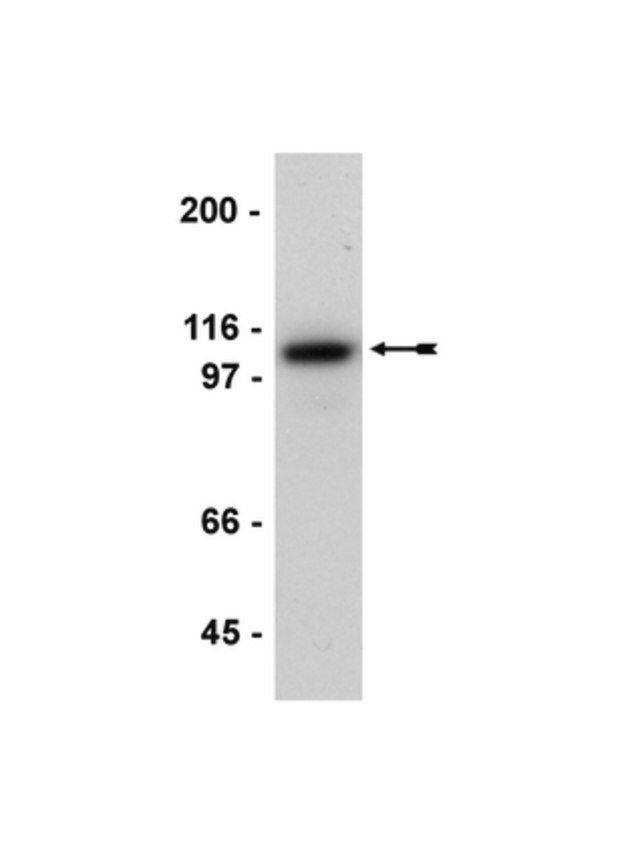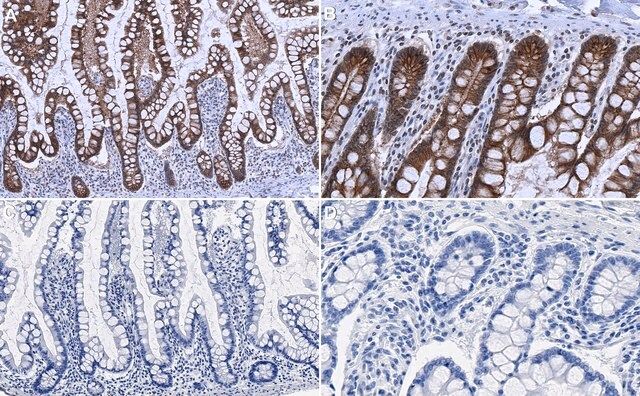您的位置:首页 > 产品中心 > 抗E钙粘蛋白抗体
抗E钙粘蛋白抗体
Anti-E-Cadherin Antibody

产品别名
抗E钙粘蛋白抗体
Anti-E-Cadherin Antibody
基本信息
| eCl@ss | 32160702 |
| NACRES | NA.41 |
| General description【一般描述】 | Cadherin-1 (UniProt: P12830; also known as CAM 120/80, Epithelial cadherin, E-cadherin, Uvomorulin, CD324) is encoded by the CDH1 (also known as CDHE, UVO) gene (Gene ID: 999) in human. Cadherins are calcium-dependent cell adhesion molecules that participate in cell-cell adhesion during embryogenesis, development, organogenesis, and differentiation. E-cadherin is a single-pass type I membrane glycoprotein that is mainly expressed in non-neural epithelial tissues. It is synthesized with a signal peptide (aa 1-22) and a propeptide (aa 23-154) that are subsequently cleaved off to produce the mature form that contains an extracellular domain (aa 155-709), a transmembrane domain (aa 710-730), and a cytoplasmic domain (aa 731-882). N-glycosylation at Asn-637 is shown to be essential for its expression, folding, and trafficking. E-cadherin is known to contain five cadherin domains. Three calcium ions are usually bound at the interface of each cadherin domain and rigidify the connections, imparting a strong curvature to the full-length ectodomain. Post-translationally it can be cleaved into three chains: E-Cad/CTF1 (aa 701-882); E-Cad/CTF2 (aa 732-882); and E-Cad/CTF3 (aa 751-882). During apoptosis or with calcium influx, it is cleaved by a membrane-bound metalloproteinase (ADAM10; at residues 700-701), which causes disruption of cell-cell adhesion and the subsequent release of b-catenin into the cytoplasm. The residual membrane-tethered cleavage product is then rapidly degraded via an intracellular proteolytic pathway. It can also be cleaved by PS1/g-secretase (at residues 731-732) and this cleavage promotes disassembly of adherens junctions. Caspase 3 can cleave it at residues 750-751, which releases the cytoplasmic tail resulting in disintegration of the actin microfilament system. (Ref.: Marambaud, M., et al. (2002). EMBO J. 21(8); 1948-1956; Steinhausen, U., et al. (2001). J. Biol. Chem. 276(7); 4972-4980; Ito, K., et al. (1999). Oncogene. 18(50); 7080-7090). |
| Specificity【特异性】 | 钙粘蛋白 根据序列同源性预测与小鼠、大鼠、猩猩、牛、鸡和犬发生交叉反应 |
| Immunogen【免疫原】 | 对应于人 E-钙黏着蛋白氨基酸 859-874 的合成肽 |
| Application【应用】 | 研究子类别 粘附力(CAMs) 研究类别 细胞结构 Detect E-Cadherin using this Anti-E-Cadherin Antibody validated for use in Immunohistochemistry and WB. Immunohistochemistry (Paraffin) Analysis: A 1:250 dilution of this antibody detected E-Cadherin in Human small intestine tissue sections. Western Blotting Analysis: A 1:1,000 dilution of this antibody detected E-Cadherin in HepG2 cell lysate. |
| Quality【质量】 | 通过免疫印迹对 HepG2 细胞的 RIPA 裂解液进行了常规评估。 |
| Physical form【外形】 | 血清 |
| Other Notes【其他说明】 | |
| Legal Information【法律信息】 | UPSTATE is a registered trademark of Merck KGaA, Darmstadt, Germany |
产品性质
| biological source【生物来源】 | rabbit |
| Quality Level【质量水平】 | 100 |
| antibody form【抗体形式】 | serum |
| antibody product type | primary antibodies |
| clone【克隆】 | polyclonal |
| species reactivity | human |
| packaging【包装】 | antibody small pack of 25 μL |
| manufacturer/tradename | Upstate® |
| technique(s) | immunohistochemistry: suitable western blot: suitable |
| isotype【同位素/亚型】 | IgG |
| NCBI accession no.【NCBI登记号】 | NM_004360.2 |
| UniProt accession no.【UniProt登记号】 | P12830 |
| shipped in【运输】 | ambient |
产品说明
| Target description【目标描述】 | 106kDa |
| Storage and Stability【储存及稳定性】 | 自出厂之日起在 -20°C 下为 2 年 |
| Disclaimer【免责声明】 | 除非我们的产品目录或产品附带的其他公司文档另有说明,否则我们的产品仅供研究使用,不得用于任何其他目的,包括但不限于未经授权的商业用途、体外诊断用途、离体或体内治疗用途或任何类型的消费或应用于人类或动物。 |





